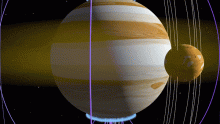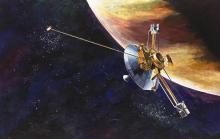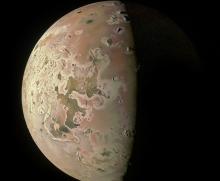Listen to today's episode of StarDate on the web the same day it airs in high-quality streaming audio without any extra ads or announcements. Choose a $8 one-month pass, or listen every day for a year for just $30.
You are here
Moon and Jupiter
In mythology, the god Jupiter sometimes dispatched his foes with a lightning bolt. And his namesake, the planet Jupiter, may have dispatched some early planets — not with lightning, but simply with its presence.
Jupiter is the most massive planet in the solar system — more than 300 times heavier than Earth. That gives Jupiter a strong gravitational pull, which allows it to push around many of the other bodies in the solar system.
That’s especially true of the comets and asteroids. Jupiter’s gravity causes asteroids to form two “clumps” that share the planet’s orbit — one ahead of Jupiter, and one behind. It also alters the orbits of comets.
When the planets were just taking shape, though, Jupiter’s influence might have been much more dramatic.
A study a few years ago said that several planets might have been born where Earth and the other small, rocky planets are today. But Jupiter briefly moved much closer to the Sun than it is now. That altered the orbits of the inner planets and the giant chunks of rock left over from their formation. That created a series of collisions that blasted the inner planets apart. Much of their debris spiraled into the Sun. But some of it coalesced to form new planets — including Earth.
Mighty Jupiter looks like a brilliant star. And tonight, it has a close companion: the full Moon. Jupiter is to the lower left of the Moon at nightfall, and follows the Moon across the sky later on.
Script by Damond Benningfield






